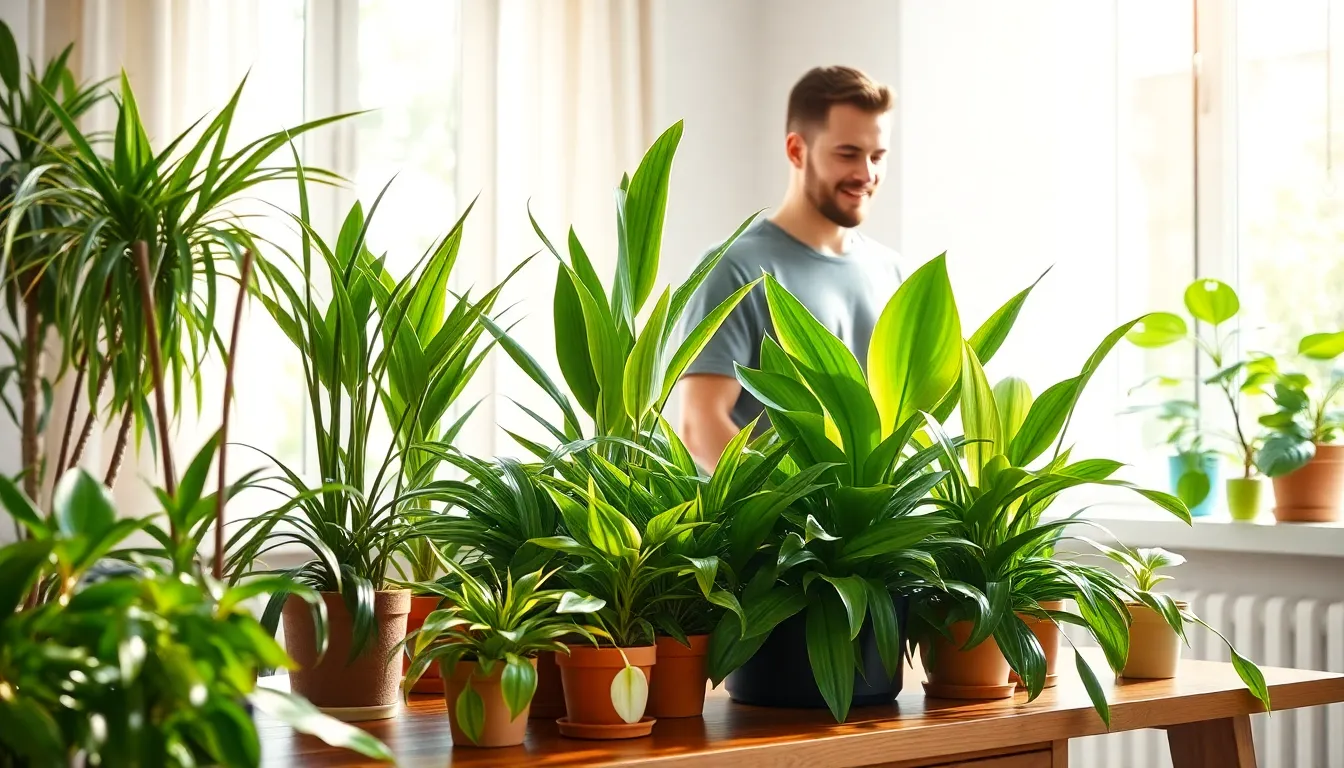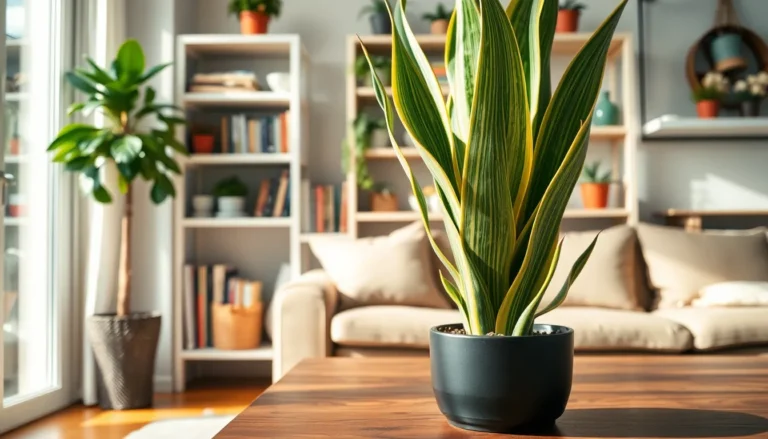In a world buzzing with technology and concrete jungles, nature plants are like a breath of fresh air—literally. These green companions not only beautify spaces but also work tirelessly to improve air quality and boost mood. Who wouldn’t want a leafy friend that helps them breathe easier and feel happier?
Imagine sipping your morning coffee surrounded by vibrant foliage that whispers sweet nothings about serenity and tranquility. Nature plants are the unsung heroes of home decor, offering a touch of the wild without the need for a safari guide. Whether you’re a seasoned plant parent or just starting your green journey, embracing nature plants can transform your living space into a lush oasis. So why not let these leafy wonders work their magic in your home?
Nature Plant
Nature plants significantly enhance urban environments. These plants improve air quality by absorbing pollutants and releasing oxygen. Many individuals experience reduced stress levels around greenery, fostering calmness and focus. Research indicates that indoor plants can increase productivity by up to 15%. Properly placed nature plants can lower ambient temperatures, creating a more comfortable living space.
Numerous types of nature plants thrive indoors. Popular choices include spider plants, snake plants, and peace lilies. Each plant type offers unique benefits, such as easy maintenance or air purification. Homeowners often appreciate the aesthetic appeal of these green additions. They can transform dull corners into lively spaces.
Nature plants also support overall well-being. Regular exposure to plants can enhance mood and reduce anxiety. Studies show that interacting with plants can lead to feelings of happiness and relaxation. Many people engage in gardening as a therapeutic activity, finding joy in nurturing their green companions.
Integrating nature plants creates a harmonious atmosphere. Incorporating a variety of plants can improve the visual appeal of homes. Positioning them near windows allows for optimal sunlight, promoting growth. Enthusiasts often recommend grouping plants with similar light and water needs to simplify care.
Adopting nature plants brings both environmental and personal benefits, making homes more vibrant and refreshing. Embracing these plants leads to healthier living spaces and improved personal well-being.
Benefits of Nature Plants

Nature plants offer numerous advantages that enrich both urban settings and personal well-being. Enhancing air quality and promoting mental health are two significant aspects of their value.
Environmental Benefits
Nature plants excel in improving air quality. They absorb harmful pollutants like carbon dioxide and volatile organic compounds, creating a cleaner atmosphere. Spider plants, snake plants, and peace lilies stand out for their air-purifying properties, making them excellent choices for homes and offices. Nearly 30% of indoor air pollutants can be mitigated by these plants. Greening urban spaces with nature plants increases biodiversity. More green spaces leads to better habitats for various species, promoting ecological balance.
Health Benefits
Nature plants contribute significantly to mental well-being. Exposure to greenery reduces stress levels and fosters a sense of calm. Studies indicate that indoor plants can boost productivity by up to 15%, enhancing focus in work environments. Incorporating gardening into daily routines serves as a form of therapy for many individuals, providing a fulfilling and calming activity. Improved moods result from interactions with plants, making them valuable companions in living spaces. Nature plants also aid in reducing symptoms of anxiety and depression, promoting a healthier mind.
Popular Types of Nature Plants
Nature plants offer diverse options for enhancing both indoor and outdoor environments. Choosing the right types boosts air quality and improves overall aesthetics.
Indoor Nature Plants
Indoor nature plants thrive in various lighting conditions, making them excellent choices for homes and offices. Snake plants are resilient and require minimal care. Spider plants, known for their air-purifying properties, help eliminate toxins and release oxygen. Peace lilies bloom beautifully and indicate when to water, simplifying plant care. Additionally, pothos plants adapt well to low light environments. Each of these options contributes to improved air quality and promotes a soothing atmosphere.
Outdoor Nature Plants
Outdoor nature plants play a crucial role in transforming gardens and landscapes. Lavender plants attract pollinators and release soothing scents, enhancing outdoor spaces. Ferns thrive in shaded areas, providing lush greenery. Flowering shrubs, like hydrangeas, offer vibrant colors throughout the seasons. Trees, such as oaks or maples, contribute to shade and biodiversity, supported by their roots. Many outdoor nature plants also aid in soil erosion control and improve local ecosystems.
Care and Maintenance of Nature Plants
Nature plants require specific care to thrive in urban settings. Understanding individual needs enhances their growth and overall health.
Watering and Soil Requirements
Consistent watering maintains moisture levels without oversaturation. For many nature plants, allowing the top inch of soil to dry out between waterings prevents root rot. Well-draining soil is essential for plant stability, with mixtures of potting soil and perlite or sand recommended for optimal drainage. Regularly checking soil moisture ensures plants receive adequate hydration. Depending on the species, some nature plants thrive in drier conditions, while others prefer consistently damp soil. Observing individual plant responses can inform watering schedules and soil preferences.
Light and Temperature Needs
Adequate light is crucial for the photosynthesis process. Nature plants like snake and spider plants can adapt to low light, while many flowering shrubs prefer bright indirect light. Positioning plants near windows maximizes natural light exposure. Temperature plays a significant role in plant health; most indoor plants thrive between 65°F and 75°F. Sudden temperature changes can lead to stress, so maintaining a stable environment is beneficial. Be mindful to avoid placing plants near drafts or heat sources, as these can adversely affect growth and vitality.
Conclusion
Embracing nature plants is a simple yet impactful way to enhance urban living. These green companions not only purify the air but also promote mental well-being and productivity. By integrating a variety of plants into living spaces, individuals can create a soothing atmosphere that nurtures both body and mind.
The benefits of nature plants extend beyond aesthetics; they contribute to ecological balance and biodiversity. With proper care and understanding of their needs, these plants can thrive and transform any environment into a vibrant sanctuary. Adopting nature plants is a step towards healthier living and a more harmonious relationship with the environment.




